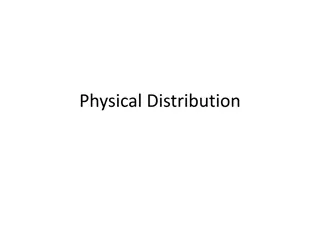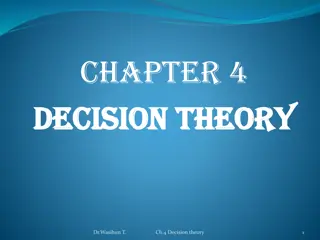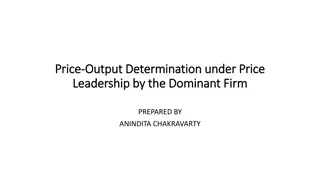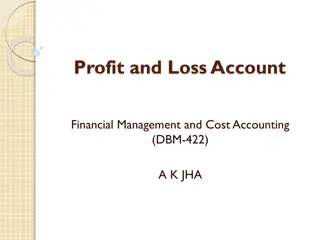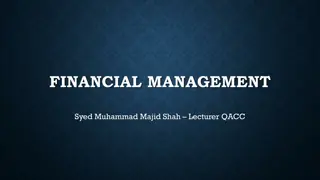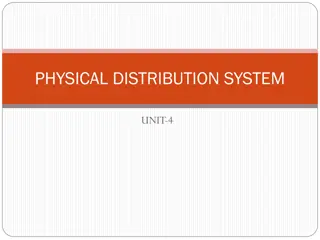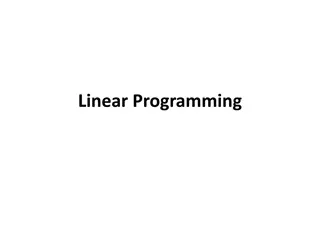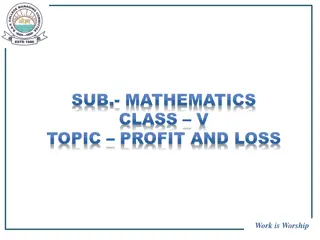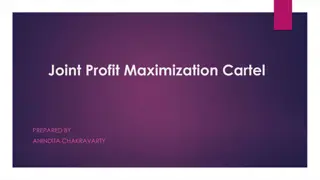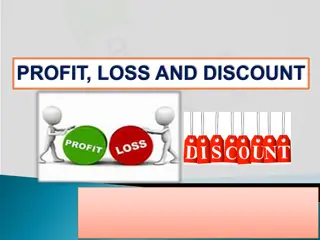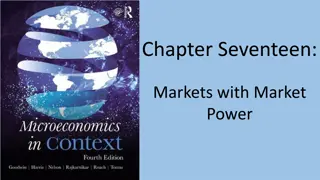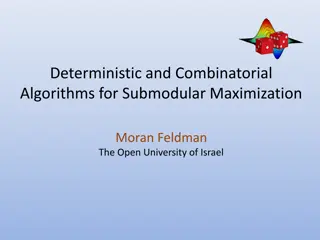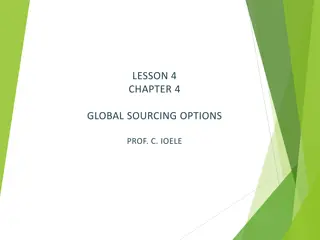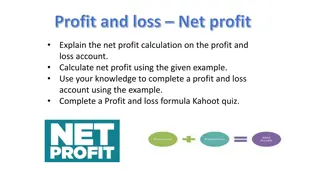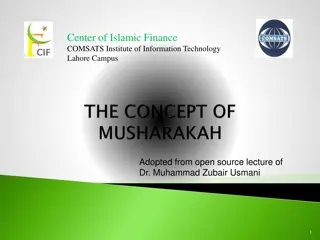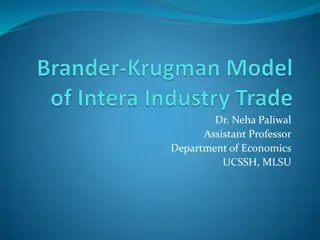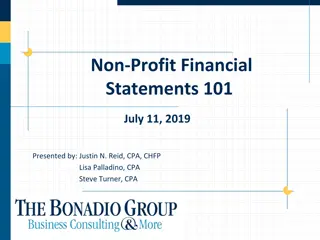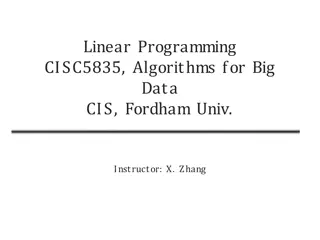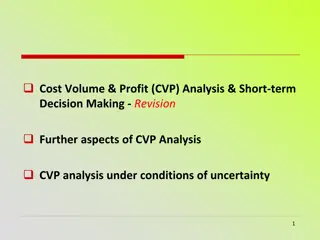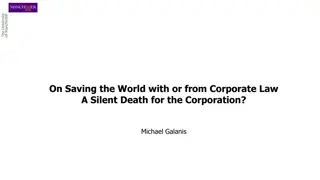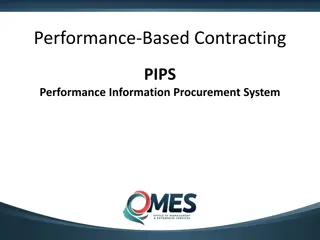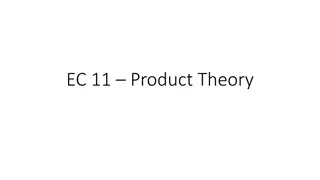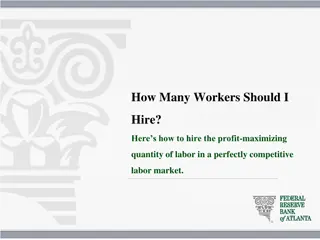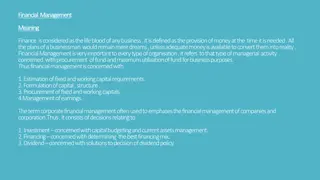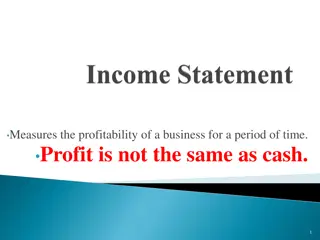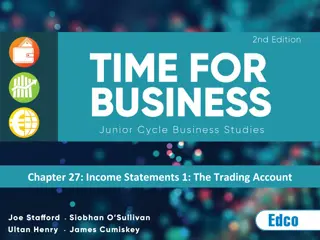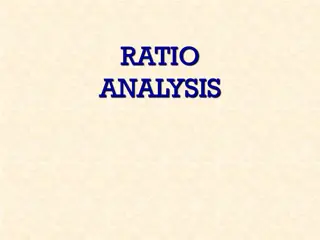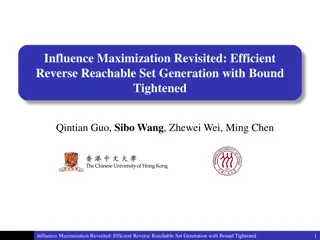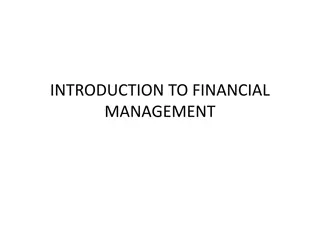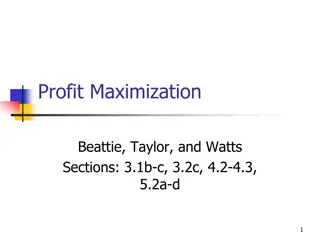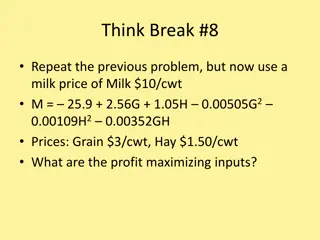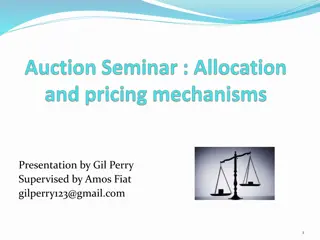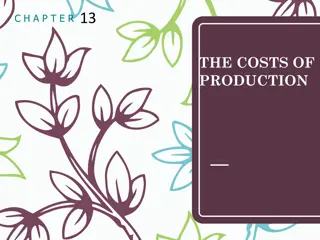Overview of Financial Management Principles
Financial management is a vital managerial process focusing on planning and controlling financial resources. Initially centered on fund collection, modern financial management emphasizes both fund collection and efficient utilization. The characteristics of the modern approach include increased emph
1 views • 7 slides
PRODUCT MANAGEMENT
The concept of product management is crucial in marketing, as a product can be anything offered to a market for attention, acquisition, use, or consumption. Products can include physical objects, services, personalities, places, organizations, and ideas. Product management involves decision-making o
7 views • 34 slides
Physical Distribution
Physical distribution is a critical aspect of business operations involving the planning, implementation, and control of the flow of goods from origin to consumer. Philip Kotler and William J. Stanton have defined physical distribution as a process of managing the movement of goods to meet consumer
0 views • 8 slides
Understanding the Scope of Managerial Economics
Managerial economics plays a crucial role in decision-making processes within businesses, focusing on optimizing limited resources for profit maximization. It encompasses both microeconomics and macroeconomics, utilizing economic theories to analyze the business environment. Key aspects such as dema
2 views • 6 slides
Financial Decision Making in Agriculture: Strategies for Profit Maximization
Explore the key principles of financial decision-making in agriculture, focusing on estimating financial implications, Doc White's 3 rules of finance, and analyzing the cost-benefit of spending on feed for milk production. Learn how to utilize partial budgets to assess profitability and make informe
0 views • 46 slides
Understanding Decision Theory in Business: A Comprehensive Overview
Decision theory in business involves making choices based on organizational objectives like profit maximization or cost minimization under conditions of uncertainty. This chapter covers key components such as alternatives, states of nature, payoffs, degree of certainty, and decision criteria. It exp
1 views • 41 slides
Price Leadership in Oligopoly Markets
Explanation of price and output determination in markets with a dominant firm exhibiting price leadership. The dominant firm utilizes market demand and small firms' supply curves to maximize profits, setting prices accordingly. Small firms follow the leader's pricing, collectively producing a portio
1 views • 5 slides
Understanding Profit and Loss Account in Financial Management
Profit and Loss Account is a crucial financial statement prepared to determine the net profit or loss of a business during a specific accounting period. It involves transferring gross profit or loss from the trading account, recording indirect expenses, including administrative and selling costs, an
0 views • 9 slides
Understanding Financial Management Principles
Financial management involves planning, organizing, controlling financial resources, and finding sources for raising funds. It includes functions such as estimating financial requirements, decision-making on capital structure and investment, cash management, and financial controls. The main objectiv
1 views • 25 slides
Understanding the Theory of Firms: Neoclassical vs. Modern Approaches
The theory of firms is explored through the Neoclassical and Modern perspectives. Neoclassical theory focuses on profit maximization, while Modern theory delves into managerial, principal-agent, and transaction cost theories. The discussion covers criticisms of Neoclassical theory and the essential
1 views • 79 slides
Understanding the Essentials of Physical Distribution Systems
Physical distribution plays a vital role in efficiently moving goods from producers to consumers through activities like transportation, warehousing, inventory control, and more. This system focuses on consumer satisfaction, profit maximization, reducing distribution costs, and improving consumer se
0 views • 28 slides
Understanding Linear Programming: An Introduction to Optimization
Linear programming, introduced by mathematician George B. Dantzig in 1947, is a mathematical technique for optimizing resource allocation in a systematic manner. It involves formulating linear relationships among variables to achieve desired results like cost minimization or profit maximization. Lin
1 views • 60 slides
Understanding Profit and Loss in Mathematics Class V
Explore the topic of profit and loss in Mathematics Class V through learning objectives, worksheets, videos, and explanations of cost price, selling price, profit, and loss. Practice solving real-world problems related to profit and loss to enhance your understanding. Embrace the concept that "Work
0 views • 29 slides
Understanding Joint Profit Maximization Cartel
In a joint profit maximization cartel, member firms surrender price and output control to achieve maximum joint profits. The central administrative authority determines output quotas based on cost minimization. The cartel works by aligning industry MR with MC to maximize profits. Advantages include
0 views • 7 slides
Understanding Profit and Loss in Business Transactions
Learn about cost price, selling price, profit, loss, profit percentage, loss percentage, marked price, discount, successive discount, goods and services tax. Explore the historical context of profit and loss statements from the barter system to modern business transactions. Practice calculating prof
0 views • 31 slides
Understanding Markets with Market Power
Explore the dynamics of markets characterized by market power through a detailed analysis of topics such as monopoly profit maximization, welfare analysis, price discrimination, and competitive firm entry effects. Delve into concepts like payoff matrices, the prisoner's dilemma, and industry concent
0 views • 14 slides
Submodular Maximization Algorithms Overview
This article discusses deterministic and combinatorial algorithms for submodular maximization, focusing on their applications in various fields such as combinatorics, machine learning, image processing, and algorithmic game theory. It covers key concepts like submodularity, examples of submodular op
0 views • 25 slides
Global Sourcing Options in Textile and Apparel Industry
Explore the crucial decisions between making and buying products in the textile and apparel industry, along with key criteria for decision-making. Learn about various sourcing options and their advantages and disadvantages, such as direct sourcing, CMT contracting, full-package sourcing, and joint v
0 views • 10 slides
Understanding Net Profit Calculation in Profit and Loss Accounts
Net profit, also known as the bottom line, is a crucial indicator of a business's financial performance. It is calculated by deducting total expenses from gross profit. In the provided example for Frying Tonite, the net profit is $30,110 after subtracting expenses of $38,590 from a gross profit of $
0 views • 11 slides
Understanding Musharakah in Islamic Finance
Musharakah is a partnership established through mutual consent for profit and loss sharing in joint ventures. Partners must be capable and enter into contracts freely. There are guidelines on profit distribution, non-working partners, capital contributions, and asset ownership in Musharakah. Avoid f
0 views • 17 slides
Equilibrium Analysis in Cournot Competition Model
The analysis focuses on a Cournot competition model between two identical countries with one producer each. The model includes linear cost functions, demand functions, revenue calculations, profit maximization conditions, and equilibrium determination in both domestic and foreign markets. By solving
0 views • 7 slides
Understanding Non-Profit Financial Statements: Key Insights
Delve into the fundamental disparities between non-profit and for-profit financial statements, exploring key indicators, such as balance sheets, assets, liabilities, and net assets. Discover the distinct financial structures and reporting methods that differentiate non-profit organizations from thei
0 views • 16 slides
Linear Programming in Profit Maximization for Boutique Chocolatier
Linear programming is utilized to maximize profits for a boutique chocolatier offering two types of chocolates. By assigning values to the production quantities of each chocolate type, and considering constraints like demand limits and production capacity, the chocolatier can determine the optimal p
0 views • 24 slides
Understanding Cost-Volume-Profit (CVP) Analysis for Short-term Decision Making
Cost-Volume-Profit (CVP) analysis is a crucial technique for businesses to assess the impact of changes in sales volume on costs, revenue, and profit. It helps in determining break-even points, planning future operations, and guiding strategic decisions under uncertain conditions. Understanding cost
0 views • 34 slides
The Role of Corporate Law in Wealth Distribution and Capitalism
Exploring the evolution of corporations within capitalist frameworks, this analysis delves into the intertwined concepts of managerialism, infinite wealth accumulation, and the social-historical embeddedness of corporations. Through historical contexts and theoretical perspectives, the discussion de
0 views • 17 slides
Performance-Based Contracting and PIPS Approach
Performance-Based Contracting involves agencies defining problems for contractors to bid on, while the PIPS approach offers benefits like risk identification and mitigation plans, process efficiencies, and profit maximization through supplier expertise. It emphasizes simplicity, accuracy, measurabil
0 views • 25 slides
Understanding Financial Management: Key Concepts and Objectives
Finance involves managing economic resources effectively, with financial management focusing on procuring and utilizing funds to achieve organizational goals. This discipline entails key functions such as fund procurement and utilization. The objectives of financial management include profit maximiz
1 views • 26 slides
Understanding Firm Behavior in Economics
Explore the theory of firm behavior in economics, focusing on the model of a firm's inputs to produce an output, the concept of specialization and diminishing returns, analysis of average and marginal product, graphical representation, and considerations in determining where a firm produces. Learn a
0 views • 60 slides
Maximizing Profit in a Corn Production Scenario
In a perfectly competitive labor market producing corn, we aim to determine the optimal number of farmworkers to hire for profit maximization. By comparing the Marginal Revenue Product and Marginal Factor Cost, we analyze the additional corn production with each added worker. Through step-by-step ca
0 views • 12 slides
Importance of Financial Management in Business
Finance is crucial for the success of any business, serving as the lifeblood that fuels operations. Financial management involves efficiently procuring and utilizing funds to achieve optimal business outcomes. Objectives include profit maximization, wealth maximization, increasing revenue, reducing
0 views • 4 slides
Issues and Trends in For-Profit Child Care: A Comprehensive Overview
The prevalence of for-profit child care centers in Canada is on the rise, with about 29% of center spaces dedicated to for-profit services in 2021. Ontario's childcare landscape shows a significant presence of both non-profit and for-profit multi-site groups. International examples from countries li
0 views • 13 slides
Understanding Business Profitability and Income Statements
The concept of business profitability, illustrated through Mr. Seow's iPhone selling business, is explained in detail. The calculation of profit considering costs like rent and salaries is demonstrated. Gross profit, net profit, and their significance in measuring business success are discussed alon
0 views • 8 slides
Understanding Income Statements in Financial Accounting
An income statement, comprising of a Trading Account and Profit and Loss Account, is vital for assessing a company's financial performance. It helps determine profits, losses, and overall worth. The Trading Account specifically calculates the gross profit or loss from core activities, while the Prof
0 views • 18 slides
Understanding Ratio Analysis for Business Performance Evaluation
Ratios in ratio analysis are crucial for analyzing and comparing business performance over time and against other businesses. They are categorized into profitability, liquidity, and efficiency ratios. Profitability ratios like gross profit percentage, net profit percentage, and return on capital emp
0 views • 31 slides
Efficient Reverse Reachable Set Generation for Influence Maximization
This research revisits the influence maximization problem, focusing on efficiently generating reverse reachable sets with tightened bounds. The Independent Cascade (IC) model is explored along with existing solutions based on Random Reverse Reachable Set. The concept of RR sets and their significanc
0 views • 17 slides
Understanding the Basics of Financial Management
Financial management involves planning, organizing, directing, and controlling financial activities in a business. It encompasses objectives such as profit maximization and wealth maximization, along with functions like traditional and modern approaches to finance. Key financial decisions include ca
0 views • 11 slides
Understanding Profit Maximization and Revenue Concepts in Economics
Explore the concepts of profit maximization, revenue generation, and marginal analysis in economics. Learn how to define profit, calculate total revenue and cost, and understand marginal revenue. Discover the significance of marginal value of product and its impact on business decision-making.
0 views • 60 slides
Profit Maximization Analysis with Milk Price Variation
Using a milk price of $10/cwt, grain price of $3/cwt, and hay price of $1.50/cwt, the profit-maximizing inputs for milk production are determined through mathematical calculations. The optimal weekly inputs are found to be 182.5 lbs of grain and 118.2 lbs of hay, resulting in a weekly profit of $23.
0 views • 4 slides
Social Welfare Maximization and Truthful Mechanisms in Curricula Review
Explore the concept of social welfare maximization through the lens of truthful mechanisms in curriculum review. Understand the VCG mechanism, Nash equilibrium, and the formal definition of maximizing social welfare. Learn about the importance of designing mechanisms that promote honesty and optimiz
0 views • 36 slides
Understanding the Costs of Production and Profit Maximization
Explore the concept of costs of production in business, distinguishing between explicit and implicit costs. Learn the difference between economic profit and accounting profit, and understand the importance of considering all costs in maximizing profit. Dive into examples and the production function
0 views • 36 slides


